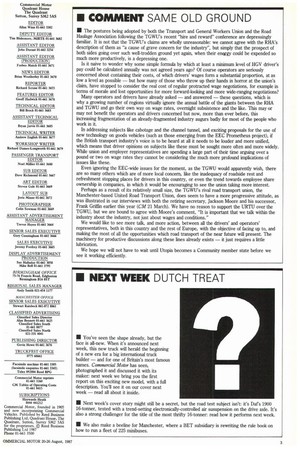• COMMENT SAME OLD GROUND
Page 5

If you've noticed an error in this article please click here to report it so we can fix it.
• The postures being adopted by both the Transport and General Workers Union and the Road Haulage Association following the TGWU's recent "hire and reward" conference are depressingly familiar. It is not that the TGWU's claims are wholly unreasonable: we cannot agree with the RHA's description of them as "a cause of grave concern for the industry", but simply that the prospect of both sides going over such well-trodden ground yet again, when their energy could be expended so much more productively, is a depressing one.
Is it naive to wonder why some simple formula by which at least a minimum level of HGV driver's pay could be calculated annually was not agreed years ago? Of course operators are seriously concerned about containing their costs, of which drivers' wages form a substantial proportion, at as low a level as possible — but how many of those who throw up their hands in horror at the union's claim, have stopped to consider the real cost of regular protracted wage negotiations, for example in terms of morale and lost opportunities for more forward-looking and more wide-ranging negotiations?
Many operators and drivers have already asked — and answered — these questions, which is why a growing number of regions virtually ignore the annual battle of the giants between the RHA and TGWU and go their own way on wage rates, overnight subsistence and the like. This may or may not benefit the operators and drivers concerned but now, more than ever before, this increasing fragmentation of an already-fragmented industry augurs badly for most of the people who work in it.
In addressing subjects like cabotage and the channel tunnel, and exciting proposals for the use of new technology on goods vehicles (such as those emerging from the EEC Prometheus project), if the British transport industry's voice is to be heard at all it needs to be louder and more unified, which means that driver opinions on subjects like these must be sought more often and more widely. While union and employer representatives are spending a large part of their time arguing over a pound or two on wage rates they cannot be considering the much more profound implications of issues like these.
Even ignoring the EEC-wide issues for the moment, as the TGWU would apparently wish, there are so many others which are of more local concern, like the inadequacy of roadside rest and refreshment stopping places for drivers in this country, or even the trend towards employee share ownership in companies, in which it would be encouraging to see the union taking more interest.
Perhaps as a result of its relatively small size, the TGWU's rival road transport union, the Manchester-based United Road Transport Union, does seem to have a more progressive attitude, as was illustrated in our interviews with both the retiring secretary, Jackson Moore and his successor, Frank Griffin earlier this year (CM 21 March). We have no reason to support the URTU over the TGWU, but we are bound to agree with Moore's comment, "It is important that we talk within the industry about the industry, not just about wages and conditions."
We would like to see more talk, and more action, between all the drivers' and operators' representatives, both in this country and the rest of Europe, with the objective of facing up to, and making the most of all the opportunities which road transport of the near future will present. The machinery for productive discussions along these lines already exists — it just requires a little lubrication.
We hope we will not have to wait until Utopia becomes a Community member state before we see it working efficiently.




















































































